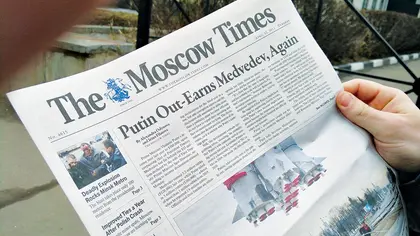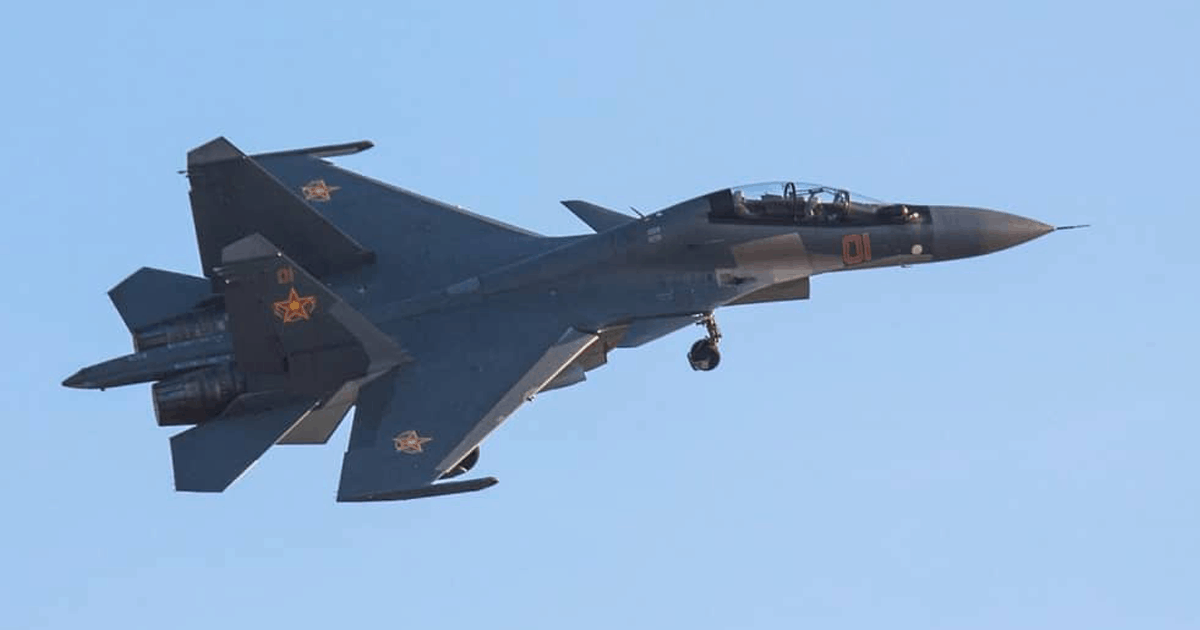Editors’ note: Writer Oleg Sukhov was previously an employee of the Moscow Times.
Independent Russian media have long been under attack from the Kremlin, and are struggling to survive financially. The country’s only English-language newspaper, the Moscow Times, is no exception.
In June the newspaper saw another change in its ownership (it has undergone three in the last 12 years). On top of that, its print edition was discontinued, and there were radical staff cuts. It now publishes on the web only.
While some attribute the changes to Moscow’s shrinking expat community and a lack of advertising, others also see the Moscow Times’ recent restructuring as a result of Russian dictator Vladimir Putin’s consistent efforts to destroy the last remaining independent media.
Founder returns
In June, the Moscow Times said that its owner, Demyan Kudryavtsev, would transfer it to a European charitable foundation headed by Dutch-born Derk Sauer, who founded the Moscow Times in 1992 and sold it to Finland’s Sanoma group in 2005. Kudryavtsev was to be made a board member at the foundation. The transfer to a charity was seen as a way to bypass the law limiting foreign ownership of Russian media.
“Sauer has more time and more vision and readiness to develop the product than I do,” Kudryavtsev told the Kyiv Post. “I’ve done a lot to turn an old-fashioned, loss-making newspaper into a more lively one that’s less loss-making, but I have many other things to do and many other publications, and Derk doesn’t.”
The Moscow Times ceased the publication of its print edition on July 6 in an effort to cut losses.
Mikhail Fishman, the newspaper’s former chief editor, known for his critical stance towards the Kremlin, was fired, and its newsroom staff was cut from about 10 to about three. Currently the Moscow Times appears to have no editor-in-chief, with Website editor Eva Hartog effectively in charge. The moves sparked fears that the Moscow Times’ editorial policy would change in a more pro-Putin direction.
Sauer said in a July 22 interview with the Republic news site that the Moscow Times should publish not just opinions critical of the authorities but also those in favor of them.
He also alarmed critics by saying that “Putin has done a lot of good things but also some things that I don’t like personally, and I can say the same about the opposition.”
“People always forget that now the average Russian’s life has become much better than before!” Sauer argued. “We must be honest about this, and should understand why Putin is so popular today. And I think one of the tasks of journalism is to explain why he is so popular.”
After his dismissal, Fishman on July 13 lambasted a Moscow Times op-ed by theater critic Alexander Kolesnikov about the cancellation of a ballet about the famous dancer Rudolf Nureyev. Kolesnikov defended the government’s position, saying that the ballet was not ready and that liberals “are prepared to believe anything but the truth.”
According to sources cited by Russian state news agency TASS and other media, the ballet was canceled because of pressure from Culture Minister Vladimir Medinsky, who deemed it to be propagandizing homosexuality — a claim that Medinsky denies.
“When we were leaving the Moscow Times, we were assured that the editorial line would remain intact,” Fishman said. “So it was quite amazing to stumble upon an op-ed like this one, not merely uncritical of the official narrative, but representing it at its best, both in style and argument.”
Fishman told the Kyiv Post that he didn’t “know any examples of this approach in the independent international press.”
Yury Saprykin, the Moscow Times’ editorial director in 2015 to 2016, told the Kyiv Post that “one could come up with thousands of schemes of Kremlin clans influencing media managers,” but said he did not have evidence that this was being done at the Moscow Times.
“We’ve gotten used to such fears regarding any publication — it’s like a reflex,” he added. Kudryavtsev dismissed accusations that the newspaper would tone down its criticism of the Kremlin.
“Editorial policy always changes when people change,” he said. “A policy that doesn’t make a newspaper profitable and thwarts the creation of an appealing product must change.”
He said that “Derk has proven that he adheres to Western journalism standards, and that the newspaper will not be propagandist.”
Russian owner
Fishman became the Moscow Times’ chief editor in November 2015 after the newspaper was bought from Sanoma by Kudryavtsev, who became its first Russian owner.
The ownership change was forced by a law signed by Putin in 2014 to limit foreign ownership of Russian media to a stake of no more than 20 percent, widely seen as an effort to limit dissenting voices.
“God really saved me from a lot of trouble,” Andrew McChesney, the Moscow Times’ editor-in-chief in 2006 to 2014, told the Kyiv Post. “You remember that Putin cracked down on the media just a few months after I left, and that caused the sale of the Moscow Times.” However, in this case the law had unintended consequences, since the team led by Fishman that Kudryavtsev brought in did not toe the Kremlin’s line.
In February, Kudryavtsev was stripped of his Russian passport due to allegedly submitting incorrect data when applying for citizenship. He linked his problems with Russian citizenship to the Russian authorities’ unhappiness with his purchase of the Vedomosti newspaper from Sanoma.
To reduce losses, in 2015 the Moscow Times switched from being a daily newspaper to a weekly.
Abdullayev era
The current troubles at the Moscow Times began in 2013, when Yekaterina Movsumova, who was outspoken about her pro-Kremlin views, was appointed as the newspaper’s publisher, while Sauer stepped down as head of the newspaper’s board of directors.
In April 2014, Nabi Abdullayev was appointed as the Moscow Times’ chief editor, becoming the first Russian to hold the job. Fears of Kremlin control over the newspaper quickly arose, as Abdullayev had previously been the head of state-owned Ria Novosti’s English-language service.
Abdullayev, who declined to comment to the Kyiv Post, fired part of the newspaper’s staff and hired his former subordinates from Ria Novosti.
Both Abdullayev and Movsumova were pushing for what they saw as more “neutral” coverage on the newspaper’s opinion pages and giving more coverage to pro-Kremlin opinion writers, and opposition-minded opinion page editor Michael Boehm was among those fired. Abdullayev also stopped publishing articles by Russian opposition journalist Yulia Latynina in the opinion section.
Abdullayev also cut coverage of Russia’s war against Ukraine, arguing that the Moscow Times could not afford sending journalists to the war zone.
In 2014 Abdullayev told UK newspaper the Guardian that the West’s “biased journalism robs the West of its moral authority.”
He also told desk chiefs not to publish any op-ed likening Putin to Adolf Hitler.
“Comparing Putin with Nazi leaders — who were such an absolute evil — is neither intelligent, because he is obviously not evil, nor useful, because the only way of dealing with Nazism is waging total war on it,” Abdullayev said, as cited by the Guardian.
Abdullayev also said Western media were ignoring the question of whether Putin’s fear of NATO encirclement had “legitimate grounds.”
In a 2015 interview with the Moscow-based French-language bi-weekly Le Courrier de Russie, Abdullayev praised Chechen strongman Ramzan Kadyrov, saying that “the future he sees for his country is Dubai” and “the power of the state is strong in Chechnya, which is an essential condition for reform.”
Kadyrov associates have been convicted of killing Russian opposition leader Boris Nemtsov and Kadyrov’s political opponents Sulim Yamadayev and Umar Israilov. Austrian police believe Israilov’s murder was ordered by Kadyrov, which he denies. Since February, Chechen authorities have also rounded up dozens of men on suspicion of being gay and are torturing and humiliating the victims, and at least three of them have been killed, according to Human Rights Watch.
In 2014 to 2015, the Moscow Times was also lambasted by pro-Kremlin commentators and attacked by hackers. In Russia, pro-government hackers have often targeted media critical of the authorities.
Media crackdown
The political pressure on the Moscow Times appears to be part of a large-scale Kremlin attack on independent media.
In March Ilya Bulavinov, a former top executive of Russia’s state propaganda TV Channel One and state-owned Ria Novosti, became the editor-in-chief of Vedomosti, which is also owned by Kudryavtsev.
Kudryavtsev stepped down as the head of the Kommersant publishing house in 2012, while its managers and editors were replaced with explicitly pro-Kremlin ones.
In 2015 to 2017, Sauer stepped down as president of RBC media group, while RBC’s executives and editors were replaced with pro-Kremlin ones, and the group was sold to a Kremlin-friendly businessman. The authorities also opened a fraud case against Sauer and other RBC executives.
Since 2011, the authorities have also cracked down or acquired more influence on many other media, including Dozhd television, the Echo of Moscow radio, gazeta.ru, grani. ru, lenta.ru, Rosbalt, Russian Planet, Bolshoi Gorod, the Russian version of Forbes, Russian Media Group, TV2, Ren TV, Gazeta.ru, Ura.ru, Ridus, Prime, Slon. ru, Svobodnaya Pressa, the Art of War and Crimea’s most independent media.
You can also highlight the text and press Ctrl + Enter





Comments (0)